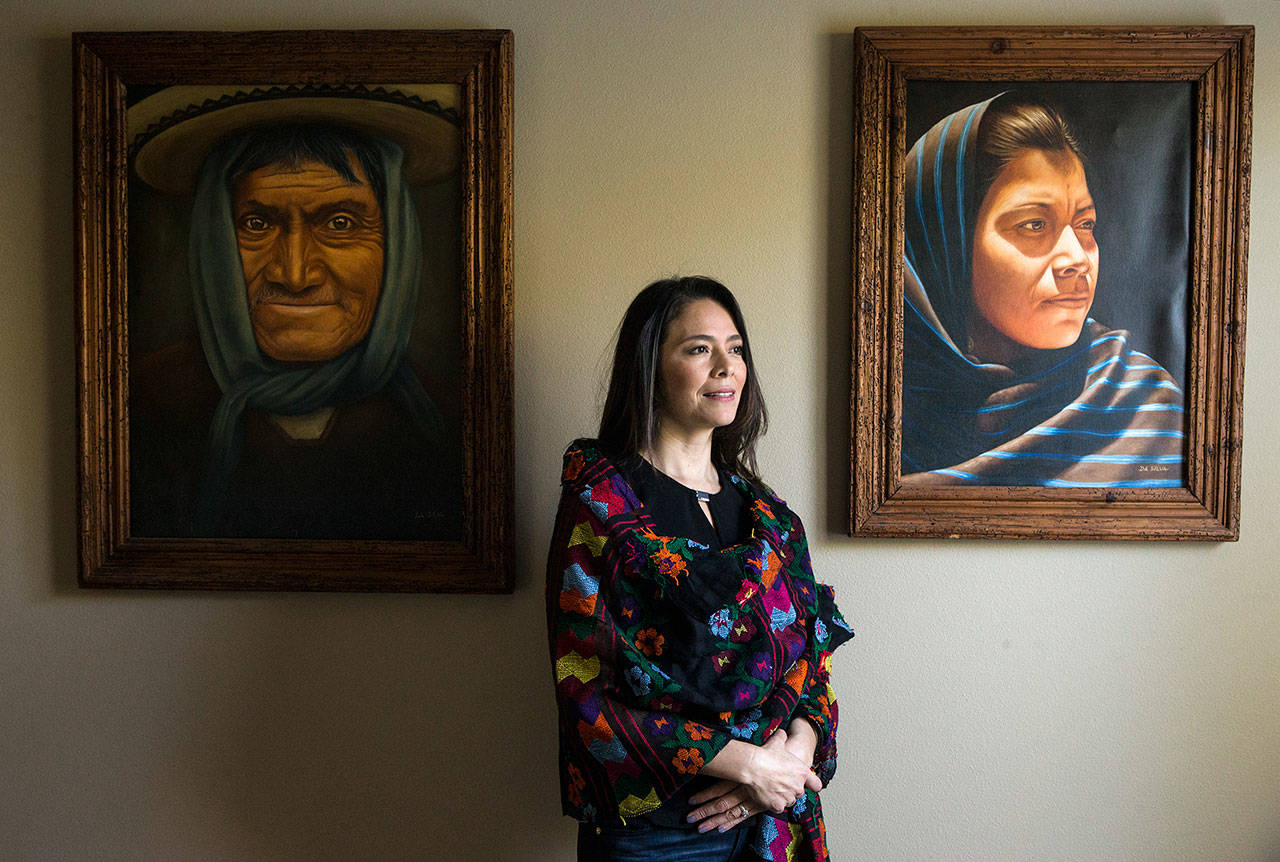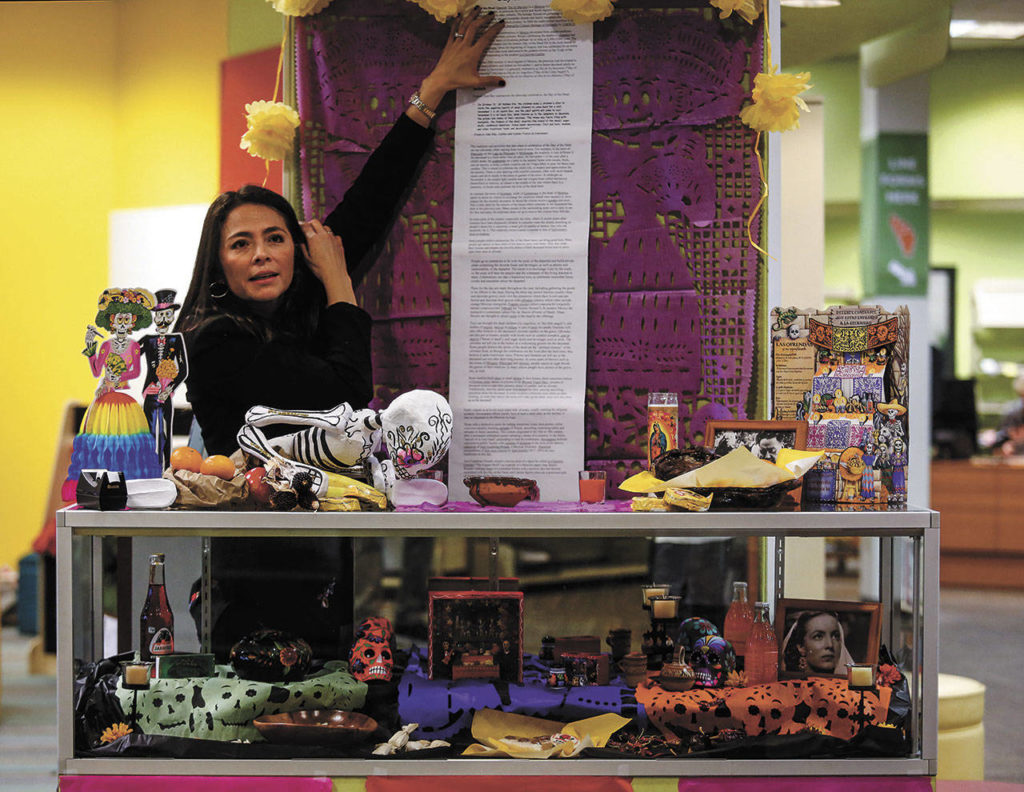Sugar skulls, candles, old photographs, marigolds and sweet rolls.
These are some of the offerings that Julieta Altamirano-Crosby placed on Day of the Dead altars to entice loved ones who’ve passed on to come back for a visit.
The Day of the Dead, or Día de los Muertos, Nov. 1 and 2, is a tradition originating in Mexico.
As they have for some 3,000 years, the shrines honored the dead and celebrated life, but these altars built in 2012 at Olympic View Middle School in Mukilteo also marked a new tradition — to keep Mexican culture alive for immigrants living here.
That same year Altamirano-Crosby, who was born and raised in Mexico, established a foundation to break down barriers to education for Latinos in her two home states: Washington and Guerrero, Mexico. It’s called the WA-GRO Foundation, for Washington (WA) and Guerrero (GRO).
As president of WA-GRO, Altamirano-Crosby has decorated many more Day of the Dead shrines since then. Through the Lynnwood-based foundation, she also has developed numerous programs in both states, from literacy and art classes in Washington to special-needs education workshops and conferences in Guerrero.
On a mission
A startling statistic about high school dropout rates for Latinos in Washington led Altamirano-Crosby to take action.
In her research, Altamirano-Crosby, 47, of Mukilteo, found that for many first-generation immigrants, culture and language have created barriers to academic success.
To succeed, immigrants must learn English. At the same time, Altamirano-Crosby believes that if they stop speaking Spanish and recognizing their heritage, they’ll lose their sense of self. If they lose their identity, they lose their way.
She felt lost after moving here with her husband, an American, and daughter from Mexico in 2009. She knew some English, but not enough.
“I’m an educated woman,” she said. “But I struggled with all the barriers.”
She didn’t want her daughter to be a statistic. She wanted to ask about Daniela’s education at Olympic View Middle School, but she didn’t have anyone to talk to. No one at the school spoke Spanish.
So she took ESL classes at Everett Community College. Not long after, she was hired as an interpreter for the Mukilteo School District. Through her work there, she realized that she wasn’t alone.
The Mukilteo School District has the largest Latino population in Snohomish County. In 2016, Mukilteo had 4,768 Latino students, followed closely by the Edmonds (4,398) and Everett (3,929) school districts. Most of them are of Mexican heritage.
Many of their parents don’t speak Spanish with them — because the kids insist on speaking English.
With the loss of their native language, Altamirano-Crosby said, they also are losing a lifeline. Her belief is that those students are more likely to turn to drugs, get pregnant or join a gang, because they don’t feel they belong.
“Identity is so important, because if you lose that — I know who I am, I know where I come from, I know where I’m going — if you don’t have that, you are nobody,” Altamirano-Crosby said. “You are lost completely.”
She made it her mission to rescue the Latino identity.
Altamirano-Crosby started small. She helped form a Latino group at Olympic View Middle School for Spanish-speaking families.
As a volunteer Latino liaison, she contacted other Mukilteo schools about forming Latino groups.
In these groups, Spanish-speaking parents meet with teachers about school issues, how they can become more involved in the classroom, and about ways to better support their children in their educations.
They also share their heritage with the school community. While WA-GRO continues to establish Latino groups at schools, it also puts on workshops for Mexican immigrants to connect them to resources, be they support groups, Spanish and ESL classes, tutoring and mentoring services, or help for at-risk youth.
“We have to work to empower the parents,” Altamirano-Crosby said. “When they’re able to adapt themselves, it enables them to help their kids.”
The foundation has since extended its reach in Washington, offering tools Latinos need to get the most out of education, including in Mukilteo, Everett, Edmonds and Lynnwood, with such partners as Sno-Isle Libraries, YMCA of Snohomish County and Everett Community College.
The foundation launched after-school programs for kids that are literacy, culture and art-focused — most of which are up and running in Snohomish County. The classes are meant to not only help kids academically, but to foster a sense of identity within themselves.
Read to Grow teaches students to read in Spanish; Latino Art Club helps them gain self-esteem and spread cultural awareness through art; Preschool Mixteco builds school-readiness skills in the Mexican indigenous language and culture; and Identity & Language teaches kids to have pride in their heritage.
WA-GRO also is working to establish sister cities between Lynnwood and Zihuatanejo, the oceanfront city in Guerrero where Altamirano-Crosby and her husband, Patrick, lived, and sister states between Washington and Guerrero.
With all these programs in place, in 2013, Altamirano-Crosby returned to Guerrero to share all that WA-GRO had accomplished.
While there, she was invited to visit a special-education school she helped build years ago in Zihuatanejo, Guerrero. What she saw shocked her.
All 54 students at the school, from birth to 22 years old, be they deaf or blind, have autism, Down syndrome, cerebral palsy or other developmental disability, were being taught the same curriculum in a building that was not air conditioned in a place where local temperatures frequently top 90 degrees. She didn’t realize until moving to America that special education in Mexico is about 30 years behind the curriculum in the U.S. because disabilities are stigmatized.
She couldn’t stay more than 10 minutes before bursting into tears. She was determined to help.
In 2014, WA-GRO established the Learning Foundation, a program to provide training and resources to special-education teachers. In the exchange program, educators from W ashington train teachers one-on-one, while doctors, therapists and psychologists offer consultations and examinations for children with special needs.
“(These professionals) have never charged us a penny for their time — and we’re taking some people who are paid $300 an hour,” said Patrick Crosby, a businessman who is the director of the WA-GRO Foundation. “They willingly use up their vacation to help us.”
The Zihuatanejo-based liaison for the program, Julia Sumner, reports that the school there has transformed in the past four years. The teachers have become more professional and experienced. The school has a library of Spanish books, air conditioning and teaching aids.
“The school is an example for other neighboring schools with similar challenges,” Sumner said.
The foundation now is working to expand its reach to all 55 special-education schools in Guerrero.
But Altamirano-Crosby didn’t stop there. She also organizes events and conferences to build disability awareness in Mexico. WA-GRO has hosted surfing, arts and crafts, kite-flying and hiking activities for families with disabled children. She is proudest of leading the very first March for Disability Awareness through town.
“We started with 75 people,” she said. “When we reached downtown Zihuatanejo, we turned around and saw 300 people. It was beautiful.”
Altamirano-Crosby continues to investigate the link between identity and language for Latinos in Washington and Guerrero, all the while emphasizing the importance of education, community, leadership, culture and art in her two homes.
She has three communications degrees. She received her bachelor’s at the Autonomous University of Guerrero-Mexico in Chilpancingo, Guerrero, earned her master’s at the Complutense University of Madrid in Spain, and her Ph.D. from the University of Havana in Havana, Cuba.
She recently earned a second master’s degree — this one in education — from Seattle Pacific University.
In 2017, she was awarded the Snohomish County Human Rights Award for her work through the WA-GRO Foundation.
When she’s not volunteering, Altamirano-Crosby works as a cultural competency consultant. She trains teachers and parents to be culturally competent, meaning to understand, appreciate and interact with people from a culture different from their own.
Around Halloween, Altamirano-Crosby will return to local schools to help with Day of the Dead altars.
“My husband jokes that I’ll volunteer for anything,” she said. “I see that (Latinos) need help in the education system and in spreading the word about disabilities, and I help. I was born and raised in Guerrero, and I care.”
WA-GRO Foundation
In Washington (WA):
In recognition of the overwhelming need to combat Latino school dropout rates, the foundation provides resources to at-risk youth, empowers their parents to navigate the education system and improves their children’s academic success by reconnecting families with their culture and heritage.
In Guerrero (GRO):
WA-GRO is empowering special-needs teachers and families in Mexico by providing training and resources to help children with disabilities reach functional independence in their culture and society. It also is working to break Mexico’s prevalent stigma of disabilities through awareness.
Learn more at www.wa-gro.com.
Washington North Coast Magazine
This article is featured in the fall issue of Washington North Coast Magazine, a supplement of The Daily Herald. Explore Snohomish and Island counties with each quarterly magazine. Each issue is $3.99. Subscribe to receive all four editions for $14 per year. Call 425-339-3200 or go to www.washingtonnorthcoast.com for more information.
Talk to us
> Give us your news tips.
> Send us a letter to the editor.
> More Herald contact information.




























